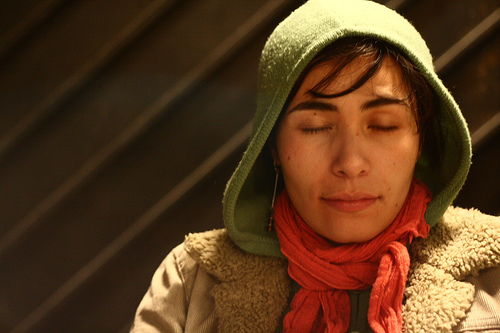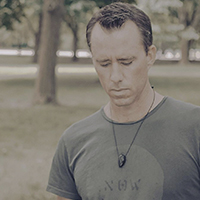
Enlightenment is just a fancy word for putting presence before thought.
You might be familiar with your own presence if you’ve ever had a near-miss accident or near-death experience. Going about your business one moment, then suddenly you’re thrust into being fully awake and alive, senses buzzing, no longer identified with the body or mind: you’re watching yourself like a character in a movie.
Zen calls this sudden enlightenment a mini-satori.
The other day an ornery little baseborn car slowed up along side me and my dog on our daily walk. As the driver stopped and lowered his black tinted window, a red aura of caution suddenly flooded my veins. “This is just my paranoid mind” I thought, “I watch way too much 10 o’clock news.” But then he turned a nefarious glare my way, as if to say you’re about to pay for my bad day.
Pardon the autobiography, but the old reactive me would have added a gallon of jet fuel to whatever tinder this cat was sitting on and blown up the block. Being curious no more, and assured the decision to not fight does not make one a doormat, I tried my hand at trust and stood in my power instead. I lowered my shoulders, lifted my chest, opened my palms and turned my gaze to the sky.
He made a disappointed study of my non-combative stance and drove on.
For all I know he was lost and in need of directions rather than ruled by bad intentions (though I do live near an area of Chicago where the police wear military combat gear on patrol). Maybe he thought I was someone else, who knows. Years of taunting and testing the darkness has convinced me to finally give up dipping litmus paper in the crazy. I now know there’s always a better choice than fight, flee, or freeze: it’s called presence.
Being a war veteran myself I can attest to the power of immanent danger to implore a heightened state of awareness. It’s the same appeal of high-wire walking, sky-diving, or living in Manhattan: that feeling you get from flirting with death I mentioned earlier. But why wait until the plane you’re on is pin-wheeling at Mach 1 toward Earth, or a baby is born?
Do you remember the dramatic shift in perception following the September 11 tragedy, how for the following week so many were compelled to drop the routine and take a good hard look at their priorities? Everyone grew suddenly pious, holding close and true to the sacred. On the wagon when everything’s gone-a-hoo, off again when the sun comes out; we’ve all been programmed to behave a little like drunkards convinced it’s ok to drive…wedding or funeral notwithstanding.
Got to grow the economy, kids. Back to bed you go.
Life offers incalculable opportunities to practice ego-abandoned presence with the same high-stakes intensity as a house fire. However mundane or exceptional this moment may seem, it’s equally deserving of reverence as this one, and this one, and this one. So what if it doesn’t demand a shot of panicked adrenaline; it does demand acknowledgement just the same. No need to get all worked up or bored stiff, just pay attention.
A friend of mine once spent 65 days sailing with his friend on a Catamaran from Rio, Brazil to San Juan, Puerto Rico. The boat’s autopilot system was constantly losing it’s satellite connection, making the entire trip an exercise in high-alert awareness; if they lost focus for even a moment they risked drifting off course (or being thrown overboard by a swinging boom). The only time either got more than two hours of sleep was during violent storms when staying on course was impossible.
For him this experience was a temporary rebirth. No distractions, just the hypnotic sway of the blue horizon and moment to moment, unbroken, concentrated attention: the perfect cocktail for transformation.
Too bad modern life favors autopilot: few hardly ever look up from their pocket-sized skinner boxes long enough to recover from the programming. I am reminded of a couple I witness at a restaurant bowing their heads low in gratitude for their meal, until I realized they were actually just nailed to the cross of their smartphones.
And a mother at Whole Foods helplessly imprisoned by the mousetrap of compulsive texting while straining to keep half an eyeball on her two young children as they terrorized the sample domes. Seemed nothing could pull her out of hypnosis short of a fire.
Shouldn’t it be our ability to place our attention on whatever we wish, whenever we wish, and for however long we wish, without having to be first tossed into a lion’s den? Zero resolve is required to drift away from the needs of the moment, but that’s how we so often choose to live: in a comfy cozy distracted slumber. That’s why I require students on my meditation retreats to leave all of their electronic devices and reading materials at home. Drop the distractions and you’re half way there.
How about a little self-imposed immediacy just to break out of the illusion?
You can experience a mini-satori right now if you like: just remember anything you are aware of is not what you are, but rather something you are aware of. This state can be attained anytime and anywhere, by practicing what I call spiritual acknowledgement: the art of watching yourself pay attention.
Two parts: pay special concentrated attention to whatever you are doing, while watching yourself do it. I’m doing that now as I write.
But be careful: thinking about paying attention is not actually paying attention—it’s thinking about it; thinking you are watching yourself is not awareness, it’s thinking about being aware. Remember, you are not your mind or body, your name or experiences. You are the conscious thinker and doer that is aware.
What part of you initiates a conscious breath? It’s not your brain; it’s the observer who decides to use the brain to tell the body to breath on purpose.
Most anyone can practice spiritual acknowledgement for a moment or two, the difficulty arises in sustaining that impersonal witnessing state in everyday life. Don’t worry about it, just practice!
Reside as the observer and pay attention to what you’re thinking and doing.
This puts your presence before thought, and will keep you in the light and out of trouble.
Satnam.
Author: Jeff Beaudoin, Ph.D.
Editor: Renée Picard
Photo: esparta at Flickr






Read 0 comments and reply